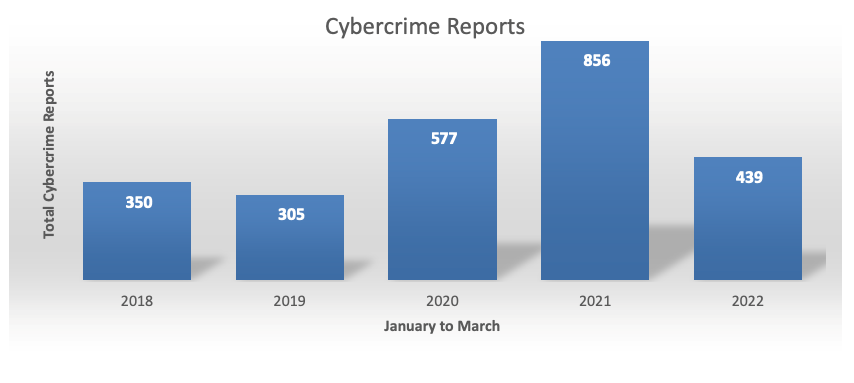Pandemic-triggered lockdowns have contributed to an upward trend in technology being used as an “instrument of crime” to create child sexual abuse material and commit fraud tied to cryptocurrency and other online scams in Vancouver.
The Vancouver Police Department’s cybercrime unit says it has seen increases over the past two years in the global problem of possession and distribution of images and videos of children, and crimes where people have lost money via the Internet.
A report that goes before the Vancouver Police Board Thursday provided statistics on the crimes captured over the first three months of 2022 and 2021, and included a chart that showed victims of online fraud lost a total of $8.09 million in that span of time.
The loss related to cryptocurrency alone was $3.42 million.

'Significant increase in child sexual abuse'
The number of cybercrime reports to the VPD from January to March in 2021 and 2022 totaled 1,295 as compared to 882 for the same three-month periods in 2020 and 2019.
Of the 1,295 cases, child sexual abuse material investigations totaled 246; there were 142 cases reported in 2020 and 2019.
“It is widely recognized in the child protection community that lockdowns and stay-at-home orders necessitated by the pandemic resulted in a significant increase in child sexual abuse as children did not leave residences and had reduced contact with the wider community, presenting offenders with an increased opportunity to physically offend,” the report said.
“As well, the same lockdowns meant offenders working from home had greater opportunity to engage in the online distribution of [child sexual abuse material].”
Project Heketara
The report didn’t include number of charges in the cases but referred to an investigation in 2019 known as Project Heketara that involved a Vancouver suspect and victims from across the world.
Police said the suspect, who was not named in the report, used encrypted cloud storage, which contained “some of the most horrific [child sexual abuse material] ever created.”
Various categories of cybercrime “increasingly pose threats to invasion of personal privacy, financial security, and organizational reputation,” said the report, noting some common examples of Internet related crimes include:
• Making, distributing, possessing or accessing child sexual abuse material.
• Luring a child via a computer.
• Non‐consensual distribution of intimate images.
• Criminal harassment, or “cyber-stalking.”
• Uttering threats, extortion, fraud, impersonation, identity theft.
• Hacking and other intellectual property crimes.
Bitcoin
In 2018, the VPD warned the federal government via a report that digital currency such as Bitcoin would be used by organized crime to launder money unless more checks and balances were implemented to set up accounts and monitor those who operate automated teller machines.
Police in Metro Vancouver saw a 350 per cent increase from 2016 to 2017 in files related to digital currency. As the time of the VPD’s report, police were investigating 70 files and said they could see more than 800 cases generated by the end of 2018, resulting in a 300 per cent increase over 2017.
Scams associated to digital currency have included people posing as Canada Revenue Agency employees who target mainly new immigrants and seniors. They are told they owe money and request the money be deposited in a Bitcoin automated teller machine to a defined address.
In February 2011, the Vancouver Courier published a story about the VPD’s efforts to capture online predators. At the time, this reporter created an online profile of a 13-year-old girl to demonstrate how quickly a discussion in a teen chat room turned into a request to perform a sexual act in front of a predator.
Det. Const. Kate Caprarie of the VPD’s Internet child exploitation unit said at the time:
“If your child is on a teen website or a teen forum, make sure you’re standing there and watching because inevitably it always turns to sex. The big thing now is webcam and wanting to get the kids on webcam to participate in some sort of sexual activity on webcam.”
@Howellings



